Property Sales, Buying, and Closing Processes: An Overview
Property Sales, Buying, and Closing Processes: An Overview

For first-time property buyers and sellers, the process to sell or buy a home will often seem like a daunting task. Buying or selling is definitely a big step forward in your life, and the process comes, unfortunately, with a long and sometimes complicated to-do list. Here is information on property sales, buying, and closing processes.
Perhaps the processes seem more lengthy for the buyer than the seller. While most people would rather go through this process as quickly and painlessly as possible — they need to be willing to go through the stress and pain that can sometimes be inherent in the process. You will want a higher chance of coming out at the end of your sale or purchase in a better position, and you will–if you follow the list of “to-dos in this article.
Once the decision has been made to sell or buy a property — just like bride and groom’s responsibilities in a marriage — know what your separate obligations entail.
Understand the responsibility of the seller to the buyer and accordingly — the buyer to the seller. Know the answerability of both parties involved in the transaction.
Whether it is the government and the taxes due to them, or the fees due to the broker, real estate agent or the real estate lawyer that may be involved in the process — know your details.
Overview of the Property Sale/Buying Closing Process
For those who don’t already know, the term ‘closing’ is used to describe the day when both money and documents are exchanged, transferring ownership of the home to the buyer. While this an exciting day, both for the buyer and seller of the property, it is essential to know that there are a bunch of steps you have to go through to get there.
Some of the more important processes or tasks are:
Title Search and Insurance
A title search is very simply a review of public records to ensure that the person claiming to be the owner of the property in question, really is the owner. Your closing agent or lawyer will order a title search on the property as soon as possible, for obvious reasons.
Besides proving the ownership of the property, a title search will also bring up any claims against the property, such as a lien. This is important because, for the sale to proceed, any issues regarding the property title must be resolved first.
This title search is important for a number of reasons ranging from fraud by unscrupulous people to errors in record-keeping of the ownership of the property. It is for this exact reason that more often than not, a mortgage lender will require a borrower to purchase title insurance before they approve a property loan.
Title insurance is simply another type of insurance, similar to a car or home insurance that provides indemnity insurance to the holder from suffering any financial loss to a purchased property as a result of an incorrect or defect to a property title.
For example, if you purchase a house and later find that it has been placed on lien for unpaid bills or other debts that have been secured by the property, this title insurance will protect you from the loss that you likely will suffer as a result of that discovery, for example, by paying off the debt covered by that lien.
The party that is responsible for the purchase of a title insurance will often vary by state and sometimes even by county.
The Home Inspection
As a seller, you should know that a home inspection is not required. Many or most buyers, however, will insist on them and they are well within their rights to do so. Unfortunately, there are many sellers who would rather avoid a home inspection as it can lead to unforeseen extra costs in the form of surprise repairs.
The point that was previously made about being willing to go through the stress and pain of the process should be repeated here.
A seller who takes the initiative to get a home inspection done.
If a seller goes ahead and gets an inspection and fixes any apparent defects before listing the house for sale, may potentially end up selling the house quicker or can potentially end up commanding a better price.
If, however, the seller does not undertake prior repairs before listing the property, and the property does turn up defects from the buyer-initiated inspection — the seller and the buyer will likely enter into negotiations as to how best to deal with the situation.
Often, as is the case in any negotiation, both sides will have to give a little bit in order to move the process forward. Otherwise, both parties will have to walk away to continue the buy/sell process.
Home Appraisal
If the buyer is not paying for the property entirely in cash, the bank or company providing the buyer’s mortgage will do a professional appraisal of the property. This is sometimes referred to as a lender appraisal. This appraisal is carried out to ensure that the amount of money the lender is loaning to the buyer is a fair representation of the value of the house to be bought.
From the seller’s point of view, if the house you are trying to sell is appraised below your asking price, most lenders will not approve the loan request of the buyer.
If this happens, you have three options: you can lower your asking price, you can ask the buyer to personally kick in the cash to make up the difference, or you can challenge the appraisal. It is in such times that the guidance of a realtor or real estate agent can come in very helpful.
The Walk-Through
The day before the closing, the buyer (as well as their agent) will do a final walk-through of the home. This is to make sure everything is in order — all the repairs are done and that the house and everything about it are as they expect it to be.
If the buyer runs into any problems at this stage, the seller will likely have to rush around to remedy the situation. The seller will want to make sure that the buyer still goes through with the sale.
The Final Sale — the day you’ve waited for.
The day the necessary paperwork is signed transferring ownership of the home to the buyer. Of course, all necessary monies will have been paid into the relevant escrow account, and all other prerequisite tasks are done.
After all the paperwork is signed, the process officially comes to a close, and the property is then bought and sold.
Selling or buying a house is no simple task. It can often be a lengthy and complex process, more so for the first time buyer or seller. There are various numbers offered by different sources, but it is reported that on average it can take anywhere from 68 to 72 days (the balance.com).
All your information will be entirely dependent on many factors that are unique to each specific situation. But prepare ahead by having the data in hand on these issues.
The post Property Sales, Buying, and Closing Processes: An Overview appeared first on ReadWrite.
(50)


